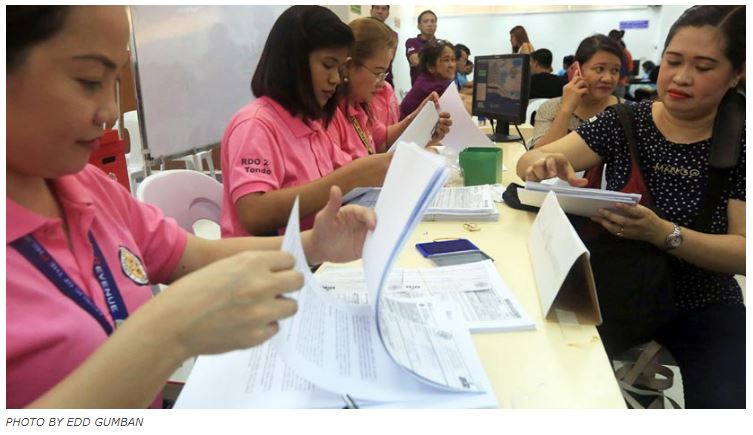OECD finds Philippines ‘largely compliant’ with standards vs tax fraud
THE PHILIPPINES is “largely compliant” with international frameworks against tax fraud, according to the latest review of the Organization for Economic Cooperation and Development (OECD), even as it cited areas of concern.
“This second-round report concludes that the Philippines is rated largely compliant overall,” which was the same rating in the 2013 first-round report, according to the OECD’s Global Forum on Transparency and Exchange of Information for Tax Purposes: The Philippines 2018 (Second Round)report published on Tuesday.
During the April 2014-March 2017 review period, the Philippines received 78 exchange of information (EoI) requests from 14 treaty partners and sent 14 EoI requests to seven partners.
“Status updates were provided in 100% of cases not receiving a complete response in 90 days. The Philippines provided complete responses to EoI partner requests in only 53% of cases within 180 days of receipt, while 25% of cases took more than a year to receive a complete response.”
The Philippines was rated “largely compliant” in terms of availability of accounting information (from “partially compliant” in 2013), rights and safeguards in terms of access to information (from “compliant”), EoI on request (EOIR) mechanisms, as well as in quality and timeliness of responses.
It is also “compliant” in terms of availability of banking information, access to information by authorities, network of EOIR mechanisms, confidentiality, rights and safeguards in terms of exchanging information.
However, it was only “partially compliant” in the availability of ownership and identity information, down from being “largely compliant in 2013.
The multilateral framework on tax transparency and exchange of information has been adopted by over 145 jurisdictions that participate in the Global Forum through peer reviews.
Such reviews focus on availability of ownership, accounting and banking information; access to information by competent authority; and exchanging information mechanisms — whether they are in place and compliant, or otherwise.
The first-round review assessed legal and regulatory frameworks while the second round checked EOIR in practice.
The previous review in 2013 found that the Philippines had “issues” in availability of information for relevant legal persons and arrangements, ensuring all of the Philippines’ exchange of information (EoI) assessments were in line with international standards, as well as timeliness of responses to EoI requests.
“Since the last review, the Philippines has addressed several of these recommendations by requiring resident agents of foreign companies to obtain legal ownership information; extending the requirement for taxpayers to maintain accounting records to 10 years; working to renegotiate or add protocols to existing DTCs (double tax conventions) to bring them in line with the standard; and providing status updates to treaty partners on outstanding requests,” OECD said.
“Despite attempts to introduce operational efficiencies and increase resources to the EoI unit, the overall efficiency of the EoI practice during the period under review remained lagging. The time taken to provide substantive responses to requests remains slow and does not ensure effective EoI in all cases, as confirmed by peers,” it added.
The report also noted that although the scope of the attorney-client privilege of non-disclosure of tax information is “potentially broader,” the proper use of such of such privilege “remains uncertain and should be monitored.”
It also said that the Philippines should ensure that notification procedures with account holders are followed, as regulations allow a 60-day delay in notifying the depositor after the full information has been actually exchanged.
“Although the Philippines signed the Multilateral Convention on Mutual Administrative Assistance in Tax Matters in 2014, the instrument still has not yet been ratified, preventing the Philippines from having EO relationships with a large number of jurisdictions party to the convention,” the report read.
The report recommended steps for the Philippines to improve compliance, including: ensuring the availability of beneficial ownership information; setting up of an effective monitoring program to ensure relevant designated non-financial businesses are adequately supervised regarding customer due diligence requirements under the anti-money laundering (AML) act; ensuring that AML-covered persons know how to properly apply identification and verification measures to obtain beneficial ownership information; monitoring suspended companies and implement supervision programs; ensuring accounting records are available for all relevant entities including suspended companies; monitoring the practical application of legal professional privilege; ensuring that there is an exception from time-specific, post-exchange notification that would allow it to not notify the account holder in cases where notification is unlikely to undermine the chance of success of the investigation on reasonable grounds; and working expeditiously to ratify the multilateral Convention on the Mutual Administrative Assistance in Tax Matters. — Elijah Joseph C. Tubayan
Source: http://bworldonline.com/oecd-finds-philippines-largely-compliant-with-standards-vs-tax-fraud/


 English
English




